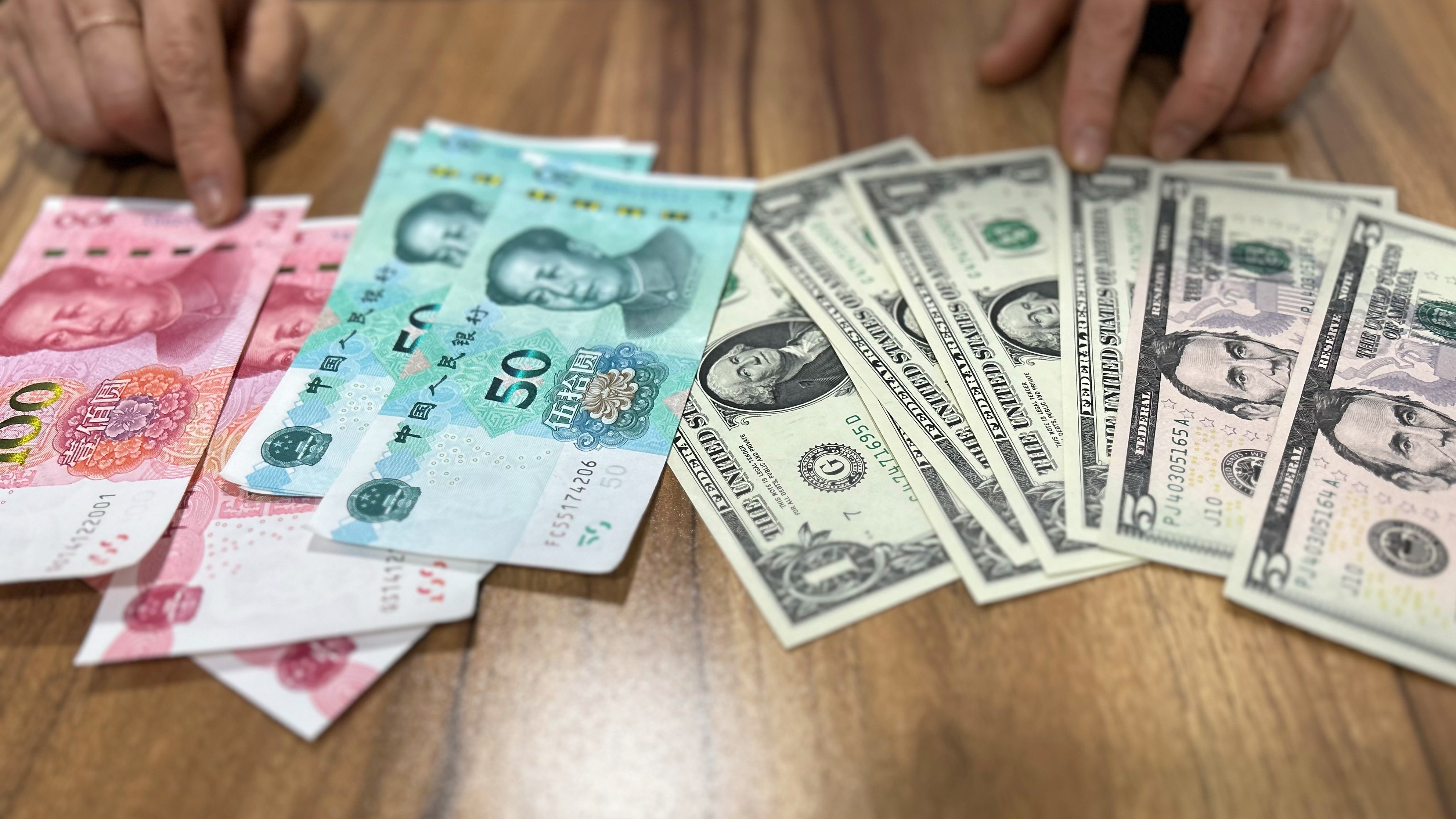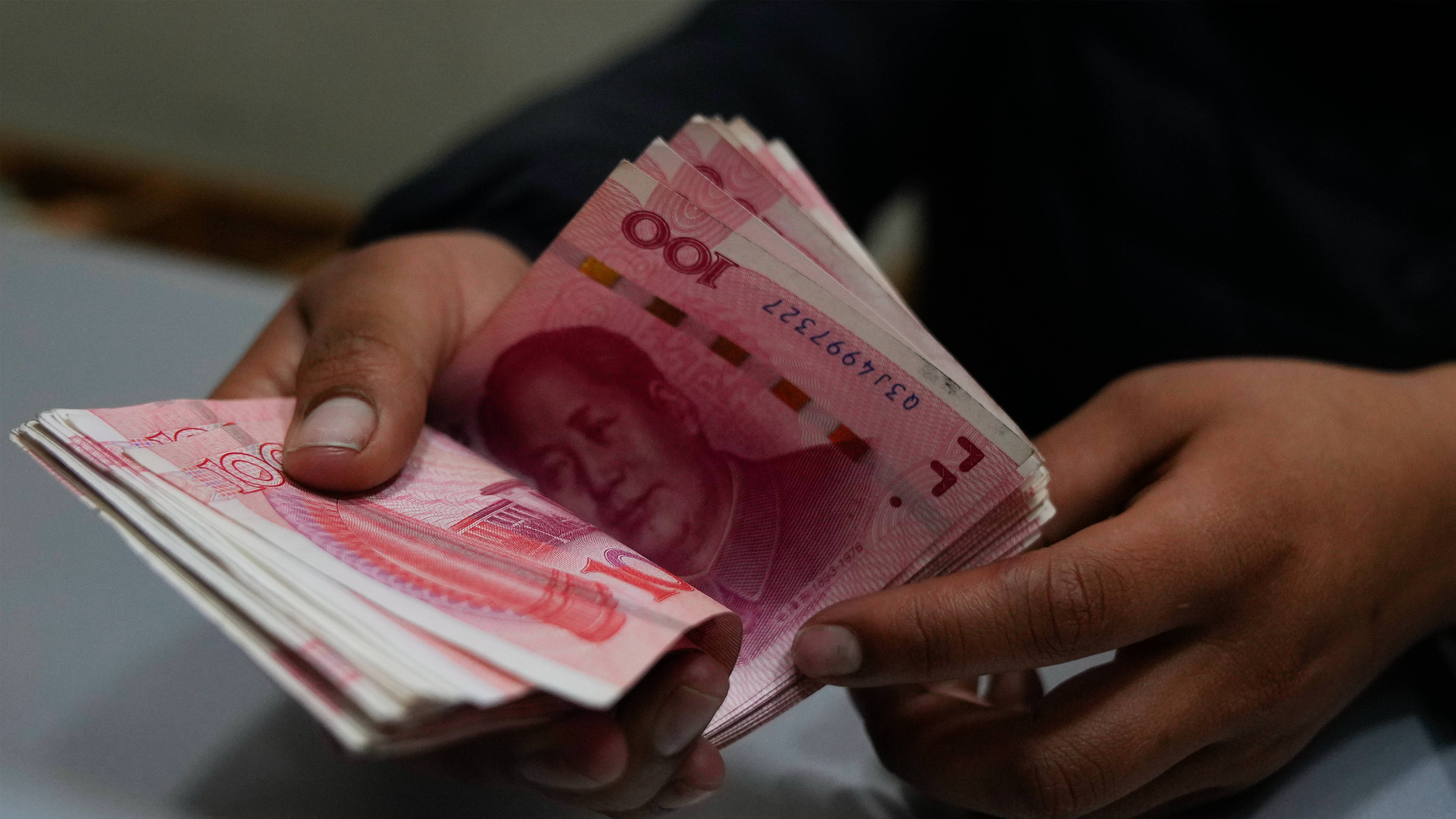
The bank notes of Chinese yuan and U.S. dollar, May 3, 2023. /AP
The bank notes of Chinese yuan and U.S. dollar, May 3, 2023. /AP
Editor's note: Mariam Shah, a special commentator for CGTN, is an Islamabad-based independent researcher in the field of conflict studies and military psychology. The article reflects the author's opinions and not necessarily the views of CGTN.
Brazilian President Luiz Inacio Lula da Silva called for the abandonment of the dollar in international trade and creation of alternatives to the American currency, in an interview on August 2, 2023.
De-dollarization has been a buzzword for the past few months, with various discussions surrounding the dominance and decline of the dollar. Several countries have recently become increasingly worried about their reliance on the U.S. dollar.
Amid decreasing foreign reserves and the increasing cost of the U.S. dollar due to rising interest rates, many central banks are looking for alternatives. Consequently, they actively explore other currencies to lessen their dependence on the dollar. This shift away from a single dominant global currency is called de-dollarization, which has started to cause ripples in the global economy.
Besides economic factors, there are many underlying political reasons for this change, including U.S. policies and sanctions against many countries. If the trend continues, it could reshape the entire international trade and financial system. As Brazil's President Lula expressed in April this year, "Every night," he asks himself "why all countries have to base their trade on the dollar." Now, many countries and leaders are asking themselves the same question.
Many countries are looking for currencies other than the dollar for trade. As the trend of de-dollarization gains momentum worldwide, Bolivia has become the third South American nation to adopt the Chinese yuan for trade settlement.
In a report published in Time magazine, the Minister of Economy and Public Finance of Bolivia Marcelo Montenegro said in a news conference, "We're already using the yuan. It's a reality and a good start…Banana, zinc, and wood manufacturing exporters are conducting transactions in yuan, as well as importers of vehicles and capital goods."
It was also shared that between May and July of this year, Bolivia engaged in financial transactions totaling 278 million Chinese yuan (approximately $38.7 million), making up 10 percent of its foreign trade. Additionally, China has become Bolivia's second-largest trade partner and a primary source of imports, and the bilateral cooperation between the two countries spans various sectors, including infrastructure, aerospace, information technology, and oil and gas development.
Bolivia has now become part of a group of South American countries, including Brazil and Argentina, which have started using the yuan in their financial transactions. In Argentina, the government announced a plan earlier this year to use the yuan for paying imports from China. It has also considered the possibility of using the Chinese currency to repay debts owed to the International Monetary Fund (IMF).

A money exchange shop worker counts Chinese yuan banknotes in La Paz, Bolivia, July 26, 2023. /AP
A money exchange shop worker counts Chinese yuan banknotes in La Paz, Bolivia, July 26, 2023. /AP
Likewise, the yuan has gained significance in Brazil's foreign reserves, as by the end of 2022, the yuan surpassed the euro to become the second most important currency, accounting for 5.37 percent of the central bank's holdings, while the euro accounted for 4.74 percent.
The use of the yuan is growing, especially in Latin America and the Caribbean and mostly "in those countries that are looking to establish stronger ties with China, that view themselves as in some way politically aligned on this particular objective on decreasing their overall reliance on the dollar and on the U.S. in general," said Margaret Myers, director of the Asia and Latin America Program at the Washington-based Inter-American Dialogue.
Moreover, using the yuan in financial transactions coincides with China's increasing regional presence through expanding trade, investments, development, and infrastructure projects. As China's economic influence grows, South American countries are capitalizing on the opportunities presented by closer ties with China. It is also a win-win for both, as South American nations have found new export markets, leading to mutually beneficial trade relationships.
The yuan's role in the international monetary system has been growing, becoming the world's fifth-largest payment currency, the third-largest trade finance currency, and the fifth-largest international reserve currency. This increasing prominence highlights the ongoing global shift away from the U.S. dollar in international trade and financial transactions.
Chinese experts believe that more countries will turn to the Chinese yuan for trade settlement, given China's status as the world's largest trading country. Additionally, many countries seek a more diversified international monetary system as the U.S. continues weaponizing its currency.
Recently, renowned author Robert Kiyosaki shared his thoughts on the upcoming BRICS Summit, scheduled for August 22, by suggesting that this annual gathering might accelerate the process of de-dollarization. The author's tweet about de-dollarizing the world through a new gold-backed currency also sparked some attention. Nonetheless, the outcomes of the BRICS Summit and its potential impact on global financial dynamics will be more apparent after the summit.
In early June, JPMorgan strategists Meera Chandan and Octavia Popescu hinted that "some signs of de-dollarization are emerging" and it is nearly 10 times faster than two decades ago. Although the dollar remains the most widely used currency in global trade, there has still been an increasing awareness about looking for alternatives among various states and central banks.
In the coming days, many countries will embrace this shifting currency paradigm, leading to de-dollarization, which will undoubtedly redefine the global economy and trade.
(If you want to contribute and have specific expertise, please contact us at opinions@cgtn.com. Follow @thouse_opinions on Twitter to discover the latest commentaries in the CGTN Opinion Section.)